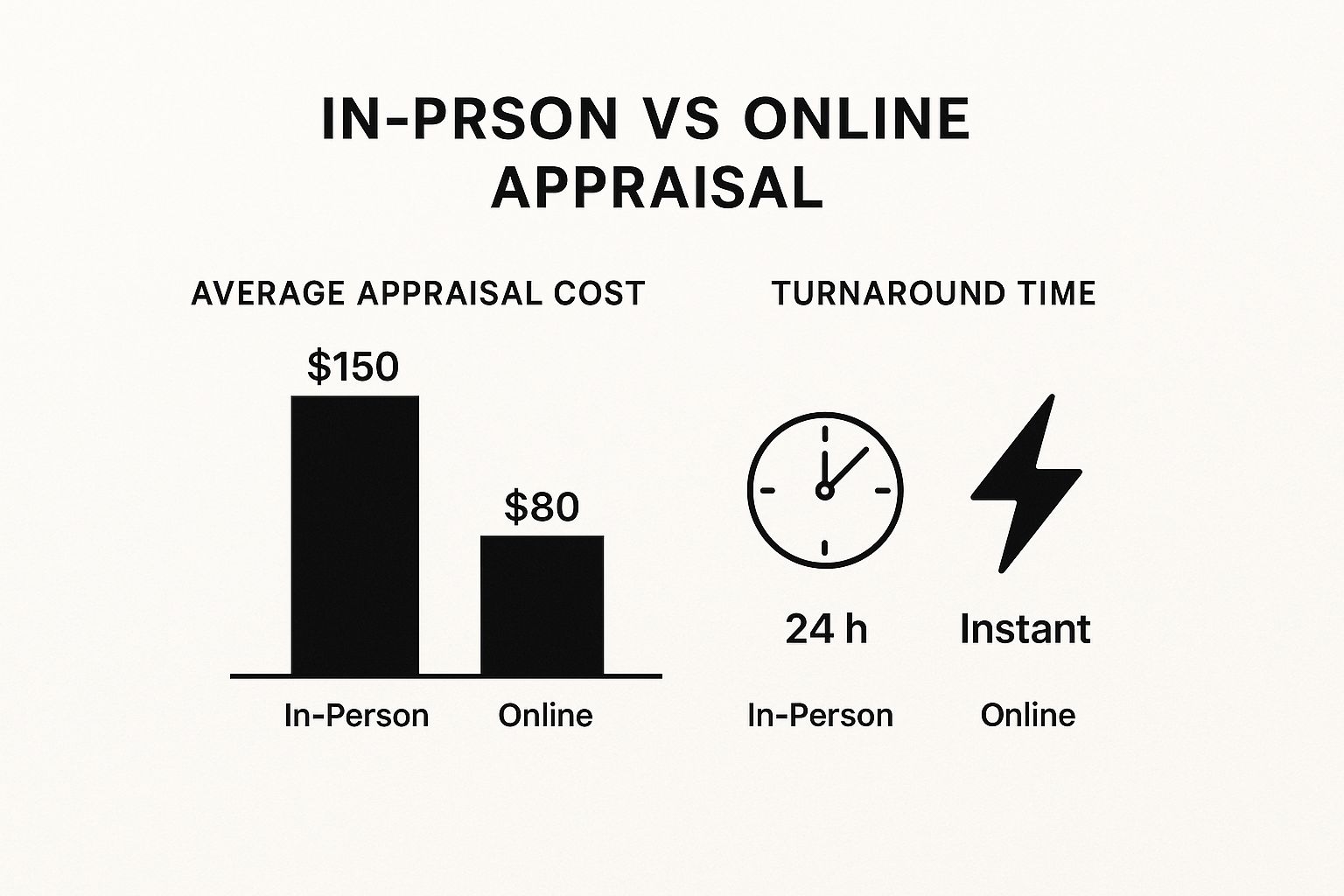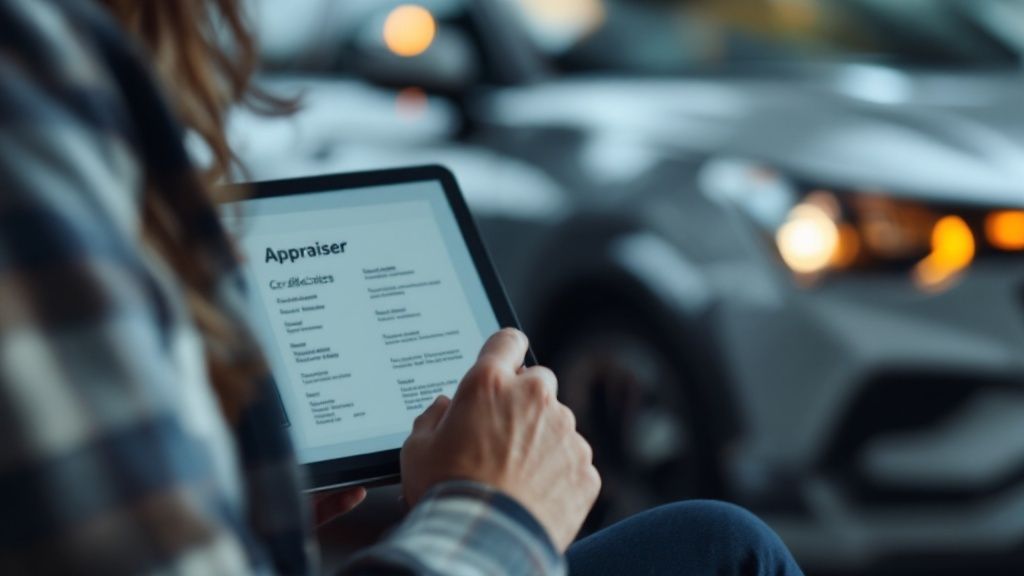So, what does it really cost to get a car appraised? The short answer is it can be anything from completely free to a few hundred dollars. It all boils down to what you need the appraisal for.
The price you'll pay depends entirely on the level of detail, accuracy, and legal muscle you need behind that final number.
What's the Real Cost of a Car Appraisal?
Think of car appraisals less like a single product and more like a menu of services. At one end, you have the quick and easy online estimators. These are great for getting a ballpark figure if you're just curious about your car's worth—and they won't cost you a dime.
On the other end of the spectrum is the certified professional appraiser. This is when you need a detailed, legally sound report that can stand up in court, satisfy an insurance company, or secure financing for a classic car. For this level of expertise, you can expect to pay anywhere from $150 to $500, sometimes even more.
The price tag simply reflects the amount of work involved. An online tool crunches numbers using general market data. A certified appraiser, however, gets their hands dirty. They perform a thorough, in-person inspection, dig into local sales data for comparable vehicles, and document every little thing that makes your car unique.
Here's a quick look at how those costs break down by appraisal type.
Estimated Car Appraisal Costs by Type
This table gives you a general idea of what to expect for different levels of car valuation services.
| Appraisal Type | Typical Cost Range | Best For |
|---|---|---|
| Online Estimators | Free | Quick ballpark figures, initial research for selling |
| Dealership Appraisals | Usually Free | Trade-in offers, convenient but often conservative |
| Independent Mechanic Inspection | $100 – $250 | Pre-purchase inspections, assessing mechanical condition |
| Certified Professional Appraisal | $150 – $500+ | Insurance claims, legal disputes, classic cars, financing |
As you can see, the investment is directly tied to the complexity and purpose of the valuation.
Key Factors That Drive Up Appraisal Fees
A few key variables will determine the final price you pay. Knowing what they are can help you pick the right service without paying for more than you need.
-
Type of Appraisal: A basic online estimate is free. A detailed report for a diminished value claim, however, demands specialized knowledge and naturally comes with a higher price tag. If you're dealing with an accident, understanding the diminished value appraisal cost is a crucial first step.
-
The Car Itself: Appraising a stock 2018 Honda Civic is pretty straightforward. But what about a heavily modified truck, a rare classic, or an exotic import? Those require a ton more research and expertise, which bumps up the cost.
-
Why You Need It: An appraisal for a simple private sale is one thing. One needed for an IRS tax donation or settling an estate is another beast entirely—it requires far more documentation and rigor.
The rule of thumb is simple: The higher the stakes—whether they're legal, financial, or insurance-related—the more you should expect to invest in a comprehensive appraisal. It’s an investment in accuracy when you need it most.
Why a Car Appraisal Is More Than Just a Price Tag

Most people assume a car appraisal is just a way to figure out a selling price. While it’s certainly useful for that, a professional appraisal goes much deeper. It’s less like a price tag and more like a detailed financial health report for your vehicle, establishing its official, defensible value.
This documented value becomes absolutely critical in situations where a quick online estimate just won’t cut it. That’s why the car appraisal cost isn't just another fee; it’s an investment in protecting yourself financially when the stakes are high.
When an Appraisal Becomes Essential
Sure, selling a car is a popular reason to get an appraisal, but there are plenty of other times when you need a formal, documented valuation. In these cases, an objective report from a certified professional isn't just a good idea—it's non-negotiable.
Here are a few real-world moments where a professional appraisal is a necessity, not a choice:
-
Insurance Claims (Diminished Value): Let's say you're in an accident that wasn't your fault. Even after perfect repairs, your car's history now has a blemish, and it's worth less. A diminished value appraisal calculates that specific loss in value, giving you the hard evidence you need to get the insurance company to pay you what you're owed.
-
Total Loss Settlements: If your car is declared a total loss, the insurer will make you an offer. An independent appraisal can be your best defense against a lowball settlement, proving your car’s true market value right before the accident occurred.
-
Legal Proceedings: During a divorce or any division of assets, a vehicle's value has to be split fairly. An unbiased appraisal provides a clear, court-admissible number, preventing arguments and ensuring an equitable distribution.
-
Estate Settlements: When an estate is being settled, the value of all assets, including vehicles, needs to be determined for tax and inheritance reasons. A certified appraisal provides the official documentation required by probate courts and the IRS.
An appraisal transforms your car from a simple possession into a documented asset. It provides a clear, unbiased number that financial institutions, insurance companies, and legal systems can rely on, protecting your interests.
Protecting Your Financial Outcome
In every one of these situations, relying on a guess or a free online tool could easily cost you thousands of dollars. An insurance company's first offer for a totaled car, for example, is often based on generic data that completely misses your vehicle's pristine condition, recent upgrades, or high local demand.
A detailed appraisal report digs into all those specifics. It becomes your negotiating tool, armed with concrete data and an expert's analysis. By spending a relatively small amount on the car appraisal cost, you get a powerful document designed to ensure you get a fair financial outcome. It’s all about making sure you receive what you're rightfully owed.
What Factors Really Shape Your Car's Value?
When an appraiser looks at your car, they're not just glancing at the make and model. Think of them as a detective, piecing together the complete story of your vehicle’s life. Every detail, from a spotless service record to a tiny door ding, is a clue to its real-world market worth.
This deep dive is why the car appraisal cost is more of an investment than a simple fee. The process goes way beyond the obvious stuff like age and mileage. Sure, a newer car with low miles will almost always have a higher starting value, but it's the little things that truly dial in that final number. An appraiser's entire job is to uncover that specific story.
The Big Three: Age, Condition, and History
Every appraisal kicks off by looking at three core elements that form the bedrock of your car's value. These are the first things an appraiser checks to get a baseline before digging into what makes your car unique.
- Age and Mileage: This one’s the most straightforward. In general, the older a car is and the more miles it has racked up, the lower its value due to simple wear and tear. But it's not always a straight line—a well-preserved older car with low mileage can easily be worth more than a newer one that's been driven hard.
- Overall Condition: This is a top-to-bottom assessment. It covers everything from the shine of the paint and the cleanliness of the interior to the mechanical health of the engine. Scratches, dents, stained upholstery, or any weird noises from under the hood will all chip away at the final value.
- Service History: A thick folder of maintenance receipts is like a gold star on a report card. It’s hard proof that the vehicle has been properly cared for, which gives an appraiser huge confidence in its reliability and adds real, tangible value.
But that’s just the starting point. From there, an appraiser has to figure out what your specific vehicle is worth in today's market.
Depreciation and What's Hot on the Market
Not all cars lose value at the same speed. That process, called depreciation, is a massive piece of the valuation puzzle. The exact model you drive plays a huge role here, as what people want to buy can either put the brakes on depreciation or send its value off a cliff.
A reliable family sedan known for cheap repairs might hold its value incredibly well. On the other hand, a niche luxury sports car could see its value plummet much faster. Recent data shows just how different these rates can be. While the average vehicle depreciation was around 12.5%, some models took a much bigger hit. For example, full-size vans dropped by 19.8% and high-end luxury cars by 19.2%, while popular compact cars only depreciated by 5.8%. You can dig deeper into these trends and see how different vehicle types are holding up in this 2025 car value overview from diminishedvalueofgeorgia.com.
An appraiser doesn't just see a "2019 SUV." They see a specific trim level, in a specific color, with a specific options package. Then they check real-time local sales data to see how fast similar models are selling and for how much.
Custom Features and Modifications
Finally, the appraiser takes a close look at anything that makes your car different from how it rolled off the factory floor. This is where things can get a little subjective.
Some modifications can boost your car's value, but others can seriously hurt it.
- Things That Can Add Value: Professionally installed upgrades often help. Think of a premium sound system, high-quality off-road tires on a truck, or tasteful performance enhancements on a sports car that enthusiasts look for.
- Things That Can Reduce Value: Extreme cosmetic changes are usually a bad idea. An unusual custom paint job, a giant rear spoiler, or a deafening exhaust system can shrink the pool of potential buyers, which almost always lowers the car's market value.
At the end of the day, the appraiser is combining all of these pieces—the core condition, market demand, maintenance records, and unique features—to build a complete, fact-based valuation report. It’s this detailed analysis that backs up the final number and shows why a professional appraisal is worlds away from a generic online estimate.
Choosing the Right Type of Car Appraisal
Picking the right car appraisal is like choosing the right tool for a job. You wouldn't use a sledgehammer to hang a picture frame, and you definitely wouldn't rely on a quick online guess when a major insurance settlement is on the line.
Each appraisal method strikes a different balance between convenience, accuracy, and cost. The key is to match the tool to the task at hand. The car appraisal cost is really a reflection of the detail and authority you’re paying for. For a quick gut-check before listing your car on Facebook Marketplace, a free online tool is probably all you need. But for high-stakes situations? A certified report is the only way to go.
Quick Estimates vs. Certified Valuations
The world of car appraisals really breaks down into three main categories. Understanding the differences is crucial so you only pay for what you truly need.
-
Instant Online Estimators: We've all used them. Sites like Kelley Blue Book or Edmunds are fantastic for getting a ballpark figure in seconds. You plug in your car's details, and an algorithm spits out a number. It’s fast and free, but that's where the benefits end. This is just an estimate based on generic data—it can't see the dent in your fender or know about the recent engine work you had done. It has zero legal weight.
-
Dealership Trade-In Assessments: When you take your car to a dealer for a trade-in, they’ll give it their own look-over. It's a convenient part of the car-buying process, but let's be honest about their motive: they want to buy your car for as little as possible to maximize their profit on the resale. Their offer is a negotiation starting point, not an unbiased reflection of its market value.
-
Independent Certified Appraisals: This is the heavyweight champion of car appraisals. A certified professional conducts a thorough, in-person inspection and creates a detailed report that holds up with insurance companies and even in a court of law. For formal proceedings, this level of detail isn't just nice to have—it's essential. For instance, in a tricky claim situation, these reports are the bedrock of your case, which you can read more about in our guide to auto insurance appraisals.
The right appraisal isn't about finding the cheapest option. It's about choosing the one that provides the right level of proof for your specific situation.
Comparison of Car Appraisal Methods
To make it easier to see the differences at a glance, let's break down how these methods stack up against each other. Each has a time and a place, but they are far from interchangeable.
| Appraisal Method | Accuracy Level | Average Cost | Primary Use Case |
|---|---|---|---|
| Online Estimator | Low | Free | Getting a quick, general value for a private sale. |
| Dealership Assessment | Biased (Low) | Free (part of trade-in) | Starting point for trade-in negotiations. |
| Certified Appraisal | High | $200 – $750+ | Insurance claims, legal disputes, classic cars, financing. |
As you can see, you get what you pay for. Free tools provide a rough idea, while a professional, paid appraisal delivers the documented proof needed for serious financial matters.
Making the Right Choice for Your Needs
So, how do you decide?
If you're just curious about what your Honda Civic might be worth, an online tool is a great, no-cost starting point. If you’re heading to the dealership, their appraisal is part of the game, but you should walk in armed with your own research to negotiate effectively.
However, for anything involving insurance claims, legal proceedings, divorce settlements, or high-value classic cars, investing in a certified appraisal is the only responsible move. That detailed report is your evidence, ensuring you get the fair outcome you deserve.

This image really highlights the trade-off. Online tools are fast and free, but a hands-on, professional appraisal commands a higher price because it delivers a much higher degree of accuracy and legitimacy.
How Economic Shifts Influence Your Car's Worth

Your car's value doesn't exist in a vacuum. It’s deeply connected to the overall health of the economy, where big-picture trends can either boost or sink its worth without you ever turning the key. When you start to grasp these forces, you see why the car appraisal cost is really an investment in pinpointing your vehicle’s true value in a market that's always on the move.
Think of the used car market as a small pond. The new car market? That's the huge lake that feeds it. If the lake's water level suddenly drops, the pond feels it almost immediately. That's a perfect picture of how new car pricing directly affects what your used car is worth.
The Ripple Effect of New Car Prices
When automakers start rolling out huge incentives and slashing prices on brand-new models, it puts a ton of pressure on the used car market. After all, why would a buyer pay a premium for a two-year-old sedan when a shiny new one is just a little more expensive? This dynamic can pull the appraised value of your car down.
On the flip side, when new car inventory gets tight and prices skyrocket—like we saw during the recent supply chain chaos—the value of used cars often goes through the roof. All of a sudden, your trusty three-year-old SUV is a hot ticket item, and its appraisal value will absolutely reflect that surge in demand.
Your car’s value is a moving target, directly influenced by the supply, demand, and pricing of new vehicles. An appraiser’s job is to pinpoint that value at a specific moment in time, accounting for these powerful external factors.
How Global Policies Impact Your Driveway
The economic web that determines your car's value stretches far beyond the local dealership lot. Broader policies and market forces play a massive role, and the car appraisal cost accounts for an expert's ability to connect these complex dots.
For instance, a mix of market forces is constantly at play. Industry experts are forecasting a 3-5% decline in new car prices, thanks to manufacturer incentives and cooling interest rates. That trend could easily push used car values down. But at the same time, potential new tariffs on imported vehicles could send prices for certain brands in the complete opposite direction. You can get a deeper dive into these 2025 car price predictions from CarEdge.
Other key economic factors are always in the mix:
- Interest Rates: When rates are low, car loans are more affordable. This tends to boost demand for both new and used vehicles, propping up prices. But when rates climb, borrowing gets expensive, which can cool off demand and soften used car values.
- Fuel Prices: A long period of high gas prices can drive up demand for smaller, fuel-sipping cars while making big, thirsty trucks and SUVs less desirable. A good appraiser knows to factor in these shifts in long-term consumer habits.
At the end of the day, your car’s appraisal is a snapshot of its value within this constantly shifting economic picture. It’s a number that reflects not just your car’s mileage and condition, but also global supply chains, national interest rates, and even international trade deals.
Getting Your Car Ready for an Appraisal to Get the Most Value
When you decide to get a car appraisal, a little prep work can seriously pay off. Think of it like staging a house before putting it on the market—you're putting your car's best foot forward to make sure its final valuation is as high as possible.
The first thing an appraiser will notice is how clean the car is. A spotless car sends a powerful message: this vehicle has been cared for. A full interior and exterior detail is a must. It's often the easiest way to add a few hundred dollars to the perceived value.
Get Your Paperwork in Order
Next, it's time to play detective and gather every document you have for the car. Having a complete, organized file shows you've been a responsible owner and gives the appraiser solid proof of the vehicle's history and condition.
Here's what you should have ready:
- Service and Maintenance Records: Show them everything—oil changes, tire rotations, major repairs. The more, the better.
- Vehicle Title: You'll need the original title to prove you own it free and clear.
- Original Bill of Sale: This is great for confirming the original options and packages the car came with.
- List of Modifications: If you've added any aftermarket parts, list them out. Receipts are a huge plus.
Deal With the Small Stuff
Little dings, scratches, and other cosmetic issues can add up, pulling the final value down. Taking care of these minor flaws before the appraiser shows up can make a real difference. For instance, a good guide to removing car oxidation can help bring tired-looking paint back to life.
Remember, the goal is to present your car as a well-cared-for asset. Every step you take reduces the appraiser’s reasons to deduct value and strengthens your position.
Of course, all this prep work won't mean much without the right professional. When you're ready, find a trusted independent auto appraiser near you to get a valuation you can count on.
Common Questions About Car Appraisal Costs

Even after getting a handle on the basics, there are always a few lingering questions about car appraisals. Let's tackle some of the most common ones we hear, so you can move forward with confidence.
The trick is to find an appraisal that delivers the right level of detail for your specific situation. That way, you’re only paying for what you truly need.
Is a More Expensive Appraisal Always Better?
Not at all. The “best” appraisal is simply the one that’s right for the job.
If you’re just trying to get a ballpark figure before listing your car for a private sale, a free online tool might be all you need. It gives you a decent starting point for setting your price.
But for things like an insurance claim, a classic car valuation, or any kind of legal dispute, a comprehensive, certified appraisal becomes non-negotiable. The higher car appraisal cost in these cases pays for a meticulous inspection, deep market research, and a legally defensible report.
The key is to match the appraisal's cost and rigor to its purpose. A higher price should deliver a report with more authority and detail, which is crucial when significant money or legal standing is on the line.
Can I Negotiate the Appraisal Fee?
With professional, certified appraisers, the fee is almost always set in stone. Their pricing is a direct reflection of their time, expertise, and the complexity of the vehicle they're evaluating. They follow strict, standardized procedures to create objective reports that can stand up in court.
You might find a little wiggle room if you’re having several vehicles appraised at the same time, but that’s the exception, not the rule. Your best bet is to always get a clear, itemized quote upfront to avoid any surprises. As for dealership trade-in appraisals, those are part of the larger sales negotiation and aren’t a separate fee you can haggle over.
How Often Should I Get My Car Appraised?
For the car you drive every day, an appraisal is usually a one-and-done deal. You get it when you need it—like when you're selling it or dealing with an insurance claim—and that’s it.
However, it’s a completely different story for classic, custom, or other high-value vehicles. For these special cars, getting a fresh appraisal every 2-3 years is a very wise investment. Their values can swing dramatically based on market trends. An up-to-date appraisal ensures your "agreed value" insurance policy covers what the car is actually worth today, not what it was worth years ago.
If you're facing a total loss or diminished value claim, don't let the insurance company dictate your car's worth. The team at Total Loss Northwest provides certified, independent appraisals to ensure you get the fair settlement you deserve. Learn how we can help at https://totallossnw.com.





